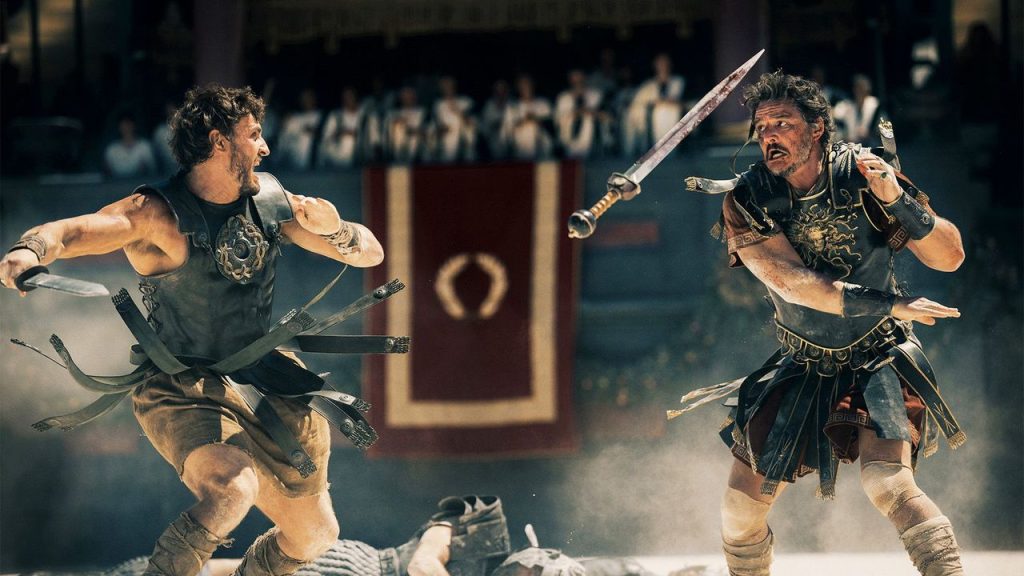
Ridley Scott’s Gladiator II delivers an exhilarating blend of heart-pounding action, emotional drama, and social commentary, cementing its place as the best popcorn film of the year. With swords, sandals, and a flood of sharks in the Roman Colosseum, this sequel to the Oscar-winning Gladiator (2000) brings a fresh wave of spectacle while diving deeper into the complexities of power, revenge, and political intrigue.
Paul Mescal, known for his more sensitive roles in Normal People and Aftersun, is the film’s mesmerizing centre. Cast against type as Lucius, Maximus’s (Russell Crowe’s) son, Mescal brings the same intensity and magnetism that Crowe exuded in the original film. His portrayal of a now grown Lucius, who has spent years in Numidia and grown into a fierce warrior, anchors the film amid its sweeping battles and larger-than-life characters. The film does lean heavily into action, with beheadings and sword fights at times overwhelming the characters, but Mescal’s strong performance ensures the emotional stakes remain intact.
Set fifteen years after the original, the film picks up with Lucius—once a young boy who narrowly escaped Rome—returning to a much more decadent and sinister empire. He is thrust into the battle against Rome’s invading forces. Scott masterfully orchestrates a grand opening sequence, where fiery catapults, swift arrows, and the tragic loss of Lucius’s wife push him toward a mission of vengeance against Rome’s ruthless General Acacius (Pedro Pascal).
The Rome Lucius returns to is ruled by two emperors, the cunning and menacing Geta (Joseph Quinn) and the unhinged Caracella (Fred Hechinger). Both emperors are chillingly bizarre, with Geta’s icy precision contrasting with Caracella’s reckless energy. Denzel Washington plays Macrinus, a powerful businessman who owns gladiators and takes an interest in Lucius, buying him to use as a weapon for his own schemes. Washington’s portrayal of Macrinus is both flamboyant and calculating, creating a character whose over-the-top exterior hides a sharp, manipulative mind. While Pascal’s role as Acacius is more subdued, his connection to Lucilla (Connie Nielsen, reprising her role from the first film) adds an extra layer of tension to the story.
The film’s action sequences are as over-the-top as one would expect from a Gladiator sequel. Roman gladiators battle tigers, rhinos, and baboons in an arena that frequently teeters into the realm of camp. At one point, Lucius is shown biting into a baboon’s arm—a bizarre but memorable moment that adds to the film’s wild spectacle. While some of the special effects, particularly the baboons and distant CGI backgrounds, feel artificial, Scott’s direction ensures that the energy of the action is infectious enough to overlook these flaws. The pacing, sharp and deliberate, rivals the best of Scott’s earlier works like Alien and Blade Runner.
Despite the violence and spectacle, Gladiator II never loses sight of its emotional and philosophical depth. Lucius’s character is written with complexity, and Mescal’s performance highlights his internal conflict. In one of the film’s most poignant moments, Lucilla realizes that the gladiator she’s been interacting with is her son, leading to a confrontation that subverts expectations and tugs at the heartstrings.
The film’s ultimate battle sequences are thrilling, but it is the quieter moments that leave the most lasting impact. Lucius’s defiant conversations with Macrinus offer a glimpse into his growing understanding of power and leadership. There’s a deep, thoughtful undercurrent running through the film, particularly when Lucius questions the values of the empire and the treatment of its heroes. In one stirring scene, Lucius challenges the crowd: “Is this how Rome treats its heroes?” His questions about the morality of power echo throughout the narrative, giving the film a timely political relevance.
At its core, Gladiator II is a meditation on political power, corruption, and the dangers of unchecked tyranny. While the original film explored the shallow distractions of the Roman mob, this sequel asks more profound questions about the nature of leadership and the responsibilities of those who wield power. The echoes of history are unmistakable, and director Ridley Scott has clearly infused the film with his own observations about today’s political landscape.
Though the film ultimately delivers an entertaining and thrilling ride, it never forgets the larger questions it wants to pose. With hints of a third film in the works, inspired by The Godfather II, fans can only hope that Scott’s vision will continue to explore the complexities of Lucius’s journey.
In the end, Gladiator II manages to balance its high-octane action with moments of reflection, making it a rare sequel that offers both spectacle and substance. Whether you’re in it for the epic battles or the thought-provoking commentary on power, this film delivers a powerful punch, reaffirming Ridley Scott’s mastery in storytelling.







